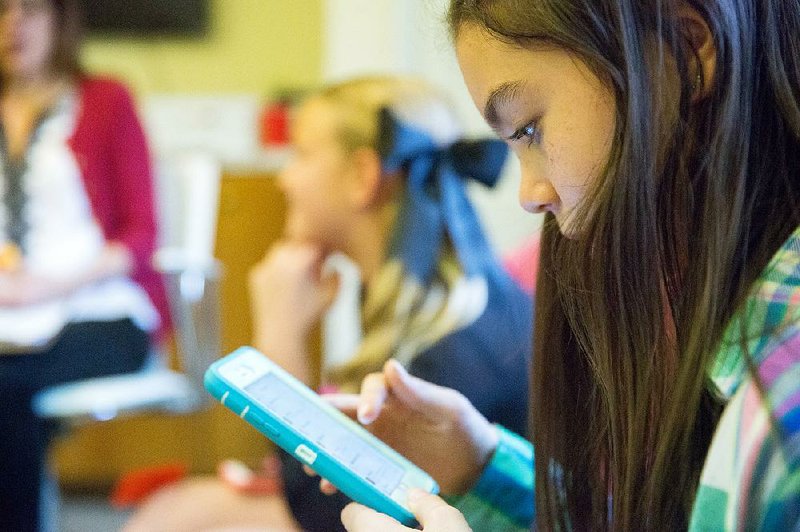AUSTIN, Texas -- A serious research session is underway in a brightly lighted conference room on a quiet boulevard in this university town, and it sounds a lot like a middle-school slumber party.
At the chic headquarters of the Center for Generational Kinetics, a consulting firm that analyzes the characteristics of different generations and the way they interact (hence "kinetics"), five young girls sit in a circle of Starburst-colored folding chairs. They sip from cans of sparkling water and fiddle with the tiny rubber balls and plastic Slinky toys that were offered to them if they felt nervous.
The girls, ages 10 through 13, are not nervous. They are excitedly talking over one another as the adult researchers in the room, Denise Villa and Elli Denison, ask them questions about their relationship with technology. For instance: Does it ever feel overwhelming being constantly connected?
"I once opened my phone after being gone for one day and I had 219 text messages," 10-year-old Kiera says.
"I lost my phone for a week once, and I had three thousand messages," 11-year-old Molly announces with a dramatic flourish.
For an hour, Villa and Denison move through a list of questions and listen carefully for any clues that may tell them more about how these girls think and behave, how their digital and daily lives intersect.
The girls are part of a generation -- sometimes called iGen or Gen Z -- that researchers are eager to understand. Depending on whom you ask, the group includes people up to age 18 or 20. They were the first to learn to navigate a tablet before they learned to talk, the first to conduct childhood friendships through portable devices, the first to have their births and baby photos and elementary school recitals shared on social media. They are the true "digital natives," a label that carries profound implications for their social lives and emotional health, not to mention their minds as studies show that constant exposure to screens changes the neural circuitry of developing brains, leading to shorter attention spans, stunted social skills and a heightened ability to multitask.
Their online personas have made them accustomed to a certain degree of attention and expo-
sure, which may have something to do with why they seem so at ease as they talk about themselves. It also does not hurt that the two 40-ish researchers, casually dressed in jeans and T-shirts, know how to talk to kids. Denison has 'tween daughters, and Villa was a middle and high school administrator.
After the session, when the group returns to the bright main office downstairs, 13-year-old Isabella shoves her fists into the pockets of her pink hoodie and surveys a wall tiled with colorful corporate logos: Hyatt, General Motors, Cheesecake Factory, Kraft, Mercedes-Benz, Marriott, the U.S. Army and dozens more.
"Are those, like, sponsors?" she asks.
"Those are our clients," the center's executive assistant answers.
In fact, Isabella, they are the reason you are here.
WHAT MAKES THEM TICK?
It might seem like the same age-old dilemma with grown-ups struggling to understand kids these days. But there is a new sense of urgency when it comes to this generation of postmillennial teens because they represent a significant turning point in societal evolution. Society and technology are always taking big leaps forward, and these leaps often feel alarmingly unprecedented -- plenty of people predicted that television would turn us into a society of slack-jawed zombies -- but many researchers agree that this generational pivot actually is unprecedented.
What does that mean for society at large? The Center for Generational Kinetics has more than 100 high-profile clients -- financial institutions, restaurants, car manufacturers, fashion retailers, education groups, tourism companies, policymakers -- who want to find out. And the sooner the better: This fall, the older members of Gen Z will be able to vote for the first time. (Only 26 percent of them say that they trust elected officials, according to the center's research.) By 2019, tens of millions of Gen Z-ers will enter the workforce. And by 2020, the young adults will wield roughly $3 trillion in purchasing power.
Clearly, there is money to be made mining the propensities of this group.
"People are trying to get the inside scoop on this generation," says Jason Dorsey, the center's co-founder and chief strategy officer. "They come to us saying, 'We can already tell they're different, but we don't know how different, and we don't know what to do about it.'"
Social trends, especially those driven by technology, ripple from the youngest generation to the oldest, Dorsey says. Automakers must determine what built-in technology future drivers will expect. Advertisers must realize that their target audience is watching YouTube instead of live TV. If Gen Z-ers prefer to shop on their phones and choose to attend college online -- and do not feel that it is necessary to conduct a job interview in person or work in an office building -- then the broader culture must respond and adapt, he says.
Last year, the research company -- which also gathers data about baby boomers, Gen X-ers and millennials -- launched a national survey to learn more about how Gen Z communicates and uses technology. The findings confirmed certain trends and illuminated a few new ones. Yes, this generation communicates almost entirely through screens, and not always with actual words (GIF graphics, videos and emoji also do the trick). Gen Z-ers are less idealistic and more thrifty than millennials, having grown up in the twin shadows of the recession and student debt crisis. When it comes to privacy on social media sites such as Instagram, Snapchat, Tumblr or Twitter, the survey showed that teens are far less guarded than millennials and Gen X members. Members of Gen Z think that everyone should get a smartphone at age 13 and that it is acceptable to use it basically anywhere -- at a family dinner, during a religious service, even at weddings (even their own future weddings, the survey shows).
And that is just scraping the surface. This is one national survey of 1,250 people, Denison says, and there is not a ton of research out there otherwise -- Gen Z is largely still uncharted territory.
With the national survey completed, the center planned its first focus groups with 'tweens and teens, using contacts in the Austin community and local schools to recruit about a dozen boys and girls with the promise of $50 for an hour or so of their time. The group is not a representative sample of the generation at large, the researchers acknowledge; for now, they are hoping to add a more personal dimension to their data.
"We just want to understand who they are, how they think and how they're making different decisions," Dorsey says.
NOT EASY TO PEG
But this is a particularly challenging generation to characterize. They are the most racially diverse generation in American history. They are extremely open-minded and fluid in the way they think about gender and sexuality. Because their digital movements are so trackable, they are prone to being data-mined and stereotyped -- yet surveys show they prize individuality over conformity.
"Ironically enough, the fact that so many of them think they're so individualistic makes them like everybody else," Dorsey notes dryly.
But even a group of mostly white, middle-class Texas kids can't be so easily summarized. Asked whether she spends most of her free time online, Kiera says: "I'd much rather read a book. Or just knit." Offered a theoretical $1,000 to spend, 14-year-old Alex reports that he would probably buy materials to forge his own knives.
Still, a few clear trends emerge over several hour-long focus group interviews. Most of the youths interviewed by Villa and Denison say they spend between two and five hours a day in front of screens. The girls tend to focus their energy on texting and connecting with their friends through social apps such as Instagram, Tumblr, YouTube and Snapchat; the boys are more likely to lurk on Reddit and play games (many games, for many hours) on smartphones and Xboxes. None of them use Facebook much, except to appease adult relatives (or "old people," as 15-year-old Daniel puts it).
Some of them talk about the lessons they have learned from watching their older peers and explain why they are more cautious than adults might realize. Take DeCora, 10, who says she learned about cyberbullying at school: "Our teacher was like, 'Don't post anything on social media that you'll regret.' And somebody in class was like, 'You can just delete the photo.'" Her silver hoop earrings sway as she shakes her head disapprovingly, because she knows better.
Or 15-year-old Kieron, who saves his allowance -- "I'm going to be, like, $100,000 in debt when I get out of college," he says matter-of-factly -- and is skeptical of credit cards: "Don't buy anything you can't pay for, that's the No. 1 rule."
The center is primarily looking for concrete guidance for its clients, but the researchers also hope to divine a deeper understanding of these young people and how they are shaped by the tech-laden world they live in. The emotional and psychological effect of their devices matters, too.
"So, social media," Denison queries. "I want to know how it affects how you feel about yourself, if it does."
DeCora shrugs. If someone is mean to her, she says, "I'll get upset about it, but I'll definitely get over it."
"Haters gonna hate," Isabella says, "and you can just block them."
Kiera, the youngest in the group, suddenly pipes up.
"Social media doesn't really affect me now," she says. "Right now, all it is is our closest friends, and they're not going to hurt us."
She pauses.
"But it might affect us more as we get older, and we're teenagers, as mean girls develop. It might affect us more when we're older and thinking that we need to be perfect."
The girls keep chatting and giggling -- kids happy to answer a few questions in exchange for a little cash. The most serious people in the room are the researchers, whose pens keep flying over their notepads, hoping to get it all down.
Family on 06/08/2016


